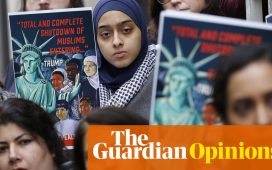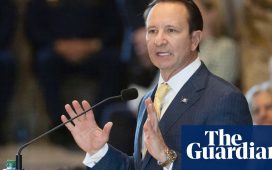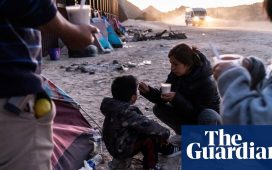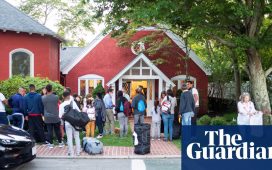Carmelita was still trying to understand why so many migrants were allowed into Del Rio, Texas, where they camped in squalor under a bridge near her home.
“I felt terrified,” she said. “There were, like, a lot of nights where I could not sleep.”
She and her friend Kimberly, both 16, were studying for school outside Starbucks, minutes from the Mexico border. They had been living on the margins of a humanitarian emergency for days, since thousands of migrants and asylum seekers trudged across the Rio Grande River and established a sprawling encampment at the edge of Del Rio.
In what felt like a war zone, both teenagers learned to fear the desperate refugees who fled to their city. When Carmelita took the trash out, her mom watched to make sure she stayed safe. Kimberly’s dad did not want her to be alone in a parking lot anymore, worried migrants might “get” her.
“They’re not clean people – not saying that in a bad way,” Kimberly said. “I don’t want to say animals, either … they’re a different breed, in my opinion.”
After as many as 15,000 migrants, many of them Black Haitians, set up camp under Del Rio’s International Bridge to await processing by immigration officials, the city’s residents were thrust under a worldwide microscope. Their border closed, choking off business. Outsiders descended on the town.
Tensions flared as the overwhelmed community cratered along deep social and economic fault lines, laid bare over the last few days. On Thursday, an aggressive heckler shut down the Rev Al Sharpton as the African American civil rights leader tried to give a press conference after a tour of the camp.
“Del Rio is a loving, caring community. We don’t want your racism in Texas. Get outta here,” the protester screamed. “Nobody wants to hear your racist nonsense in Del Rio. You’re a racist!”
The small, poor city of roughly 36,000 sits deep in the heart of west Texas. It is a dusty town, filled with restaurant chains and budget hotels. The hot air buzzes with Spanish and English. People cross the International Bridge every day, on their morning commute.

Much like other areas along the Texas-Mexico border, the vast majority of residents are Hispanic or Latino. But unlike larger border communities – for instance, the Rio Grande Valley and El Paso, Democratic strongholds – voters around Del Rio went for Donald Trump in 2020.
Some locals responded to the migrants with hate. Others directed anger at politicians. Others channeled a cool ambivalence to it all.
Amid the chaos, one thing felt certain: the city became a raw and wounded flashpoint for the loaded immigration debate.
“They’re letting these people in, knowing very well that later on, down the line, they’re gonna vote for, you know, the Democratic party,” Kimberly said.
At Alberto’s Auto Sales, the secretary, Rosalinda Reynosa, said she didn’t have anything against the migrants. But without normal traffic between Mexico and Del Rio, the business – which sits just off the port of entry – was completely empty.
“Nobody has come in. Nobody,” she said.
Reynosa lives in Ciudad Acuña, across the border, but she was staying with her daughter in Del Rio during the bridge closure.
“They’re only seeing their benefit,” Reynosa said of the migrants. “But what about us? What about us? We work for it.”
Tracy Lawson zoomed up near the bridge on his motorcycle, after driving two and half hours from San Angelo, Texas. He was upset that his tax dollars were being spent on all this, but he at least hoped law enforcement would deter people from coming unlawfully.
“We don’t need to bring a bunch of outsiders in that don’t know our way of life, that don’t know our language,” Lawson said. “That are not citizens of this country.”
He and his buddies could not trust the news any more, he said. So they were seeing the situation for themselves, before grabbing a bite and heading off to report back to friends and family.
In front of them lay the rotting carcass of a crisis, a desolate landscape guarded by gates and fences. Any last stragglers at the bridge encampment had been moved, and the clean-up operation was too blocked off to see much at all.
What lingered was a ghostly feeling, the manifestation of a “law and order” state still teeming with security personnel. Their vehicles monopolized the roads in and around Del Rio, as if they ruled the town.
To some, their presence was comforting. Kimberly saw exhausted law enforcement agents at her job, in a fast-food restaurant, and she always thanked them. Del Rio’s Democratic mayor, Bruno Lozano, depicted such agents as lifesavers and heroes, providing medical treatment or giving food and water to migrants in need.
“I was trying to prevent mass casualty, and I believe that the border patrol working alongside CBP [US Customs and Border Protection], the county, the state and my offices have all prevented that from happening,” Lozano said.
Yet that narrative was complicated by viral images of agents on horseback aggressively confronting Black migrants. After the photos caused widespread horror, border patrol stopped using horses to police migrants in Del Rio.
At a local shopping center, Juan José Lechuga said he wasn’t personally bothered by his city’s pervasive security. But he was worried about how the migrants were being treated and blamed both the state and federal governments for mismanaging the situation.
He didn’t blame the migrants. They just had needs, he said.
“They’re the ones who suffer,” Lechuga said, “because they come from very far away, and they crash into a reality that wasn’t what they were hoping for. And that is pretty serious.”







